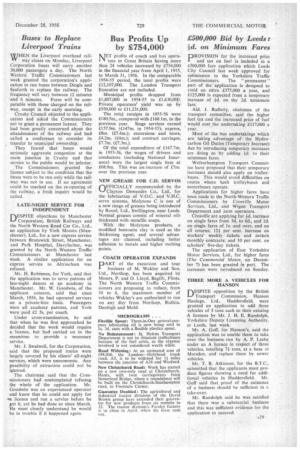Buses to Replace Liverpool Trains
Page 31

If you've noticed an error in this article please click here to report it so we can fix it.
WHEN the Liverpool overhead railway closes on Monday, Liverpool Corporation buses will carry another 30,000 passengers a day. The North Western Traffic Commissioners last week granted the corporation's application to run buses between Dingle and Sea forth to replace the railway. The frequency will vary between 12 minutes and 6 minutes. Fares will be comparable with those charged on the railway, except in the early morning.
Crosby Council objected to the application and asked the Commissioners not to grant a permanent licence. They had been greatly concerned about the abandonment of the railway and had called a conference to consider its transfer to municipal ownership.
They feared that buses would seriously aggravate congestion at the main junction in Crosby and that service to the public would be inferior.
The Commissioners granted the licence subject to the condition that the buses were to be run only while the railway was not in use. If no agreement could be reached on the re-opening of the railway, a fresh inquiry would be called, LATE-NIGHT SERVICE FOR INDEPENDENT
nESPITE objections by Manchester LI Corporation, British Railways and the North Western Road Car Co., Ltd., an application by York Motors (Manchester), Ltd., for a new express service between Brunswick Street, Manchester, and Park Hospital, Davyhulme, was granted by the North Western Traffic Commissioners at Manchester last week. A similar application for an express service to Altrincham was refused.
Mr. H. Robinson, for York, said that the application was to serve patrons of late-night dances at an academy in Manchester. Mr. W. Goodwin, of the applicant concern, said that since March, 1956, he had operated services on a private-hire basis. Passengers were all academy patrons, and York were paid £2 5s. per coach.
Under cross-examination, he said that when he was first approached he decided that the work would require a licence, but had carried on in the meantime to provide a necessary service.
Mr. J. Swalwell, for the Corporation, said that the proposed routes were largely covered by his clients' all-night services, which were uneconomic. Any possibility of extraction could not be ignored.
The chairman said that the Commissioners had contemplated refusing the whole of the application. Mr. Goodwin was an experienced operator and knew that he could not apply for ea licence and run a service before he got it, yet he had done so since March. He must clearly understand he would be in trouble if it happened again.




















































































